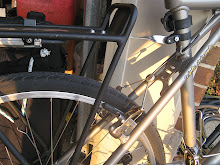Oooh... I'm going to get into SO much trouble for this post.
A lot of my friends and acquaintances have children who are attending school (usually Kindergarten) for the first time. My own two went off to third grade a few weeks ago, so it hasn't been all that long since I did the same with them. Plus, we spent a fair amount of time volunteering in the church nursery when they were little, and I saw a lot of parents dropping off their little ones for the first time - or the thirtieth time.
Folks.... GET A GRIP!
Your child is just FINE. Your child is where he (or she) is SUPPOSED TO BE. Your child is GROWING UP. Your child NEEDS to learn that it's perfectly normal to go away from mommy for the day and hang out with his friends and teacher.
Now, certainly, there are the rare exceptional case of a child who's particularly troubled in one way or the other, but I've seen FAR too many parents and children with separation problems!
Is that first day of school bittersweet for the parents? Yes. Is it a bit scary for the kid? Certainly... but only for the first five minutes or so before he meets Bobby in the chair next to him and starts chatting wildly about Bakugan. Then, usually, he completely forgets the issue until he gets home to his worried parent who, by expressing his/her concern and sadness, reminds him that going off to school is a scary thing.
My son HATES transitions. He doesn't like changing clothes. He doesn't like changing channels. He doesn't like leaving the house, the car, or anything else. And yes, the night before the first day of THIRD GRADE, he told me he didn't want to go to school. And guess what? The next morning, we got up, had breakfast, left the house and I dropped him off at school just like it was mid-November and he'd been in the routine for months. And when his mom picked him up that afternoon, guess what? He was all excited about the new friends he'd met and the old friends he'd reconnected with. Same reaction he's had every year since that first day of preschool.
I always cringed while doing nursery duty (on principle, we never watched our own kids unless it was unavoidable) when a nervous mom or dad (or both!) would make a big deal of dropping their kid off. The most well adjusted kids were
always the children of parents who dropped them off, signed the papers, and casually said "see you after Church, honey!" while walking away like it was the most normal thing in the world. The children, almost inevitably, would saunter off, find a friend and/or a toy, and be happy as a clam until mommy returned. Even on the rare occasion when a child
seemed traumatized, the vast bulk of time once mommy was out of sight the child would dry up, find a friend and/or a toy and play contentedly until mommy's return (at which time, promptly, the waterworks would be turned back on...). I could count on one hand the number of times a child was truly inconsolable - and most of those, the kid was probably ill.
I'm convinced that in the vast majority of cases, parents unwittingly project their own separation anxiety onto the children, who are usually much better adjusted to the situation than the parents. Those who teach their kids early on that it's normal to be apart for a while (church child care, occasional babysitters, preschool, then school) end up with self-confident kids who trot off to school like it's the most normal, everyday thing in the world - WHICH IT IS!
I made a rule when our kids started Kindergarten. I do not accompany them to school unless I have a need to (a) haul heavy stuff or (b) talk to the teacher. First day of school it's "Have a nice day, and watch the seatbelt when you shut the door!". Am I a mean daddy? Probably. Do my kids fret and cry over going to school? Nope. Not a bit. They usually hit the ground running.
Kids are supposed to grow up. They're supposed to go off to school, to be independent, to tie their own shoes, make their own beds and pack their own suitcases. Don't shed tears when they do these things. Laugh and clap for joy. Worry when they don't, or when they can't. But make sure they're not just picking up that vibe from you.
Go ahead... < puts on fireproof suit > Fire away...





